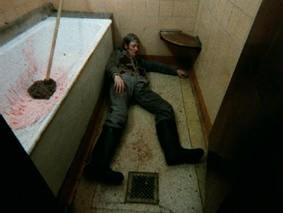There's hardly a better example of this (non)relation than Alan Clarke's film Elephant (1989), simultaneously the most and the least eloquent of statements about terror. The film is almost devoid of dialogue, and consists of a series of assassinations carried out by various un-named, unidentified characters in a depopulated, everyday suburban landscape of shops, factories, parks, gas stations and so on. The camera follows silent and seemingly ordinary figures who make their way determinedly through the city until they come across another equally anonymous figure, and then remorselessly, unfailingly, shoot.

One assassination follows another, relentlessly, horrifically, without explanation or apparent meaning. More emphatically even than Krzysztof Kieslowski's Short Film about Killing (1988), Elephant makes no attempt to justify or explain its serial murders. But the film's silence is unbearable. We inevitably attempt to construct some kind of story, some kind of frame within which to situate the slaughter, and so to relieve (displace) the shock that it causes us. As Richard Kirkland puts it, "the discrete autonomy of Elephant's violence is fundamentally compromised by the viewer's endless and troubled search for narrative" (8).
So once it is "understood" (most likely thanks to its paratexts) that the film is set in Northern Ireland during the troubles, the viewer starts to elaborate a narrative that will give the meaning and logic to the killings that the film resolutely denies us: for instance, we might read them in terms of a "cycle of violence," "tit for tat killings" performed alternately by Loyalists and Republicans. An elephant never forgets. But in that the film has forced us, its audience, to come up with these clichés, it has also foregrounded the extent to which all discourse about terrorism is imposed upon events and bodies that otherwise stop interpretation short.
Even, in the end, the judgment that such killings are "senseless" (as they are so often described in hackneyed journalistic reports) is itself part of a narrative that aims to give sense to what otherwise subverts the distinction between sense and senselessness.
(At this point let me add a heartfelt recommendation of Robert McLiam Wilson's Eureka Street, an extraordinary novel that also makes the point that terror is most fundamentally narrative's interruption.)
Gus Van Sant's movie Elephant was inspired by Clarke's film. Unlike its predecessor, Van Sant's movie does feature dialogue. But what's interesting here is the way in which language becomes no more than sound, for instance in the scene with the girl in the swimming pool. Van Sant perhaps points to another possible source of Clarke's title, Bernard MacLaverty's description of the Troubles as like having an elephant in your living room: so incomprehensible that directly addressing the issue is impossible. All the talk around violence inevitably misses its point(lessness).
One could say much more along these lines about the killing of Jean de Menezes. I don't buy either the state's self-justification or the left's critique of the state. The left seeks explanation by invoking cover-ups, racism, or conspiracy theories. The police and government declare that the shooting in Stockwell was a "tragic mistake." But the distinction between truth and error, innocent and guilty, intention and accident, is now strictly undecidable in our contemporary control society.
No comments:
Post a Comment